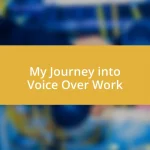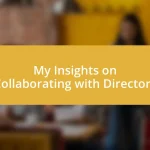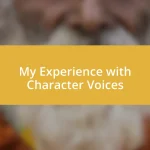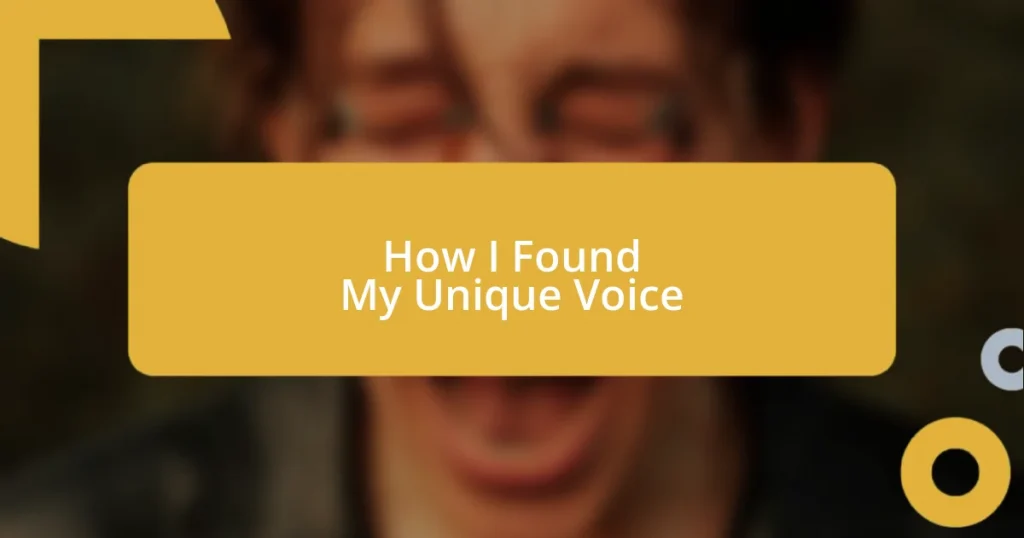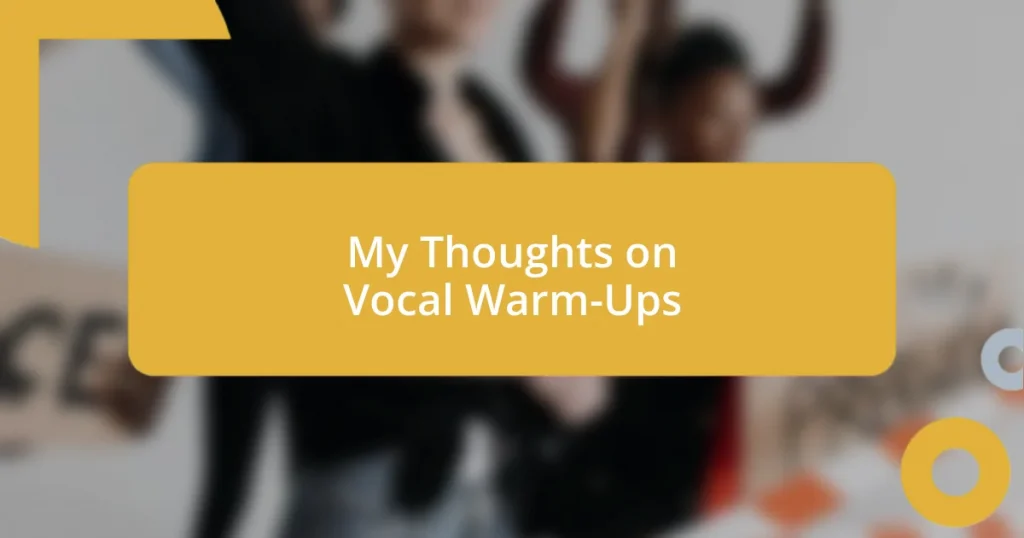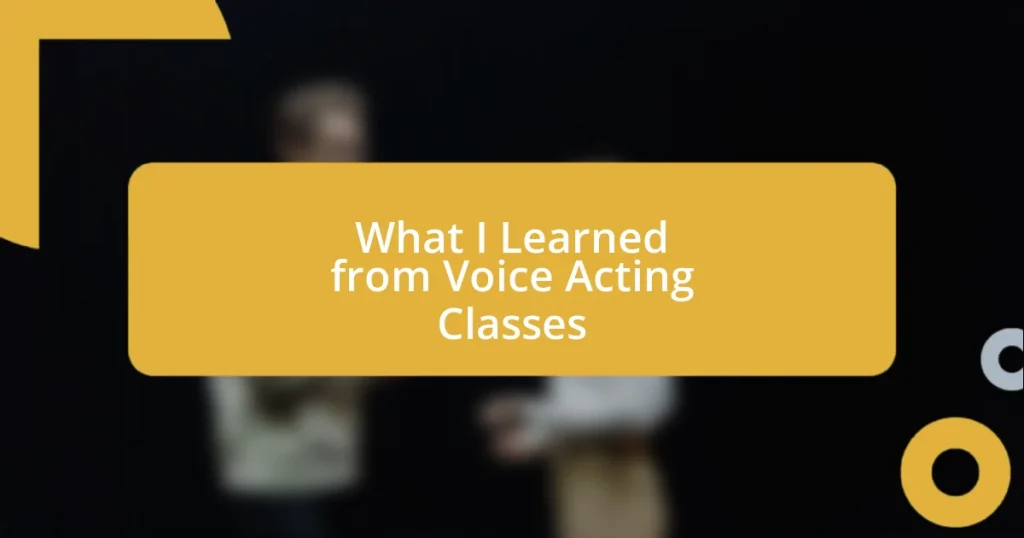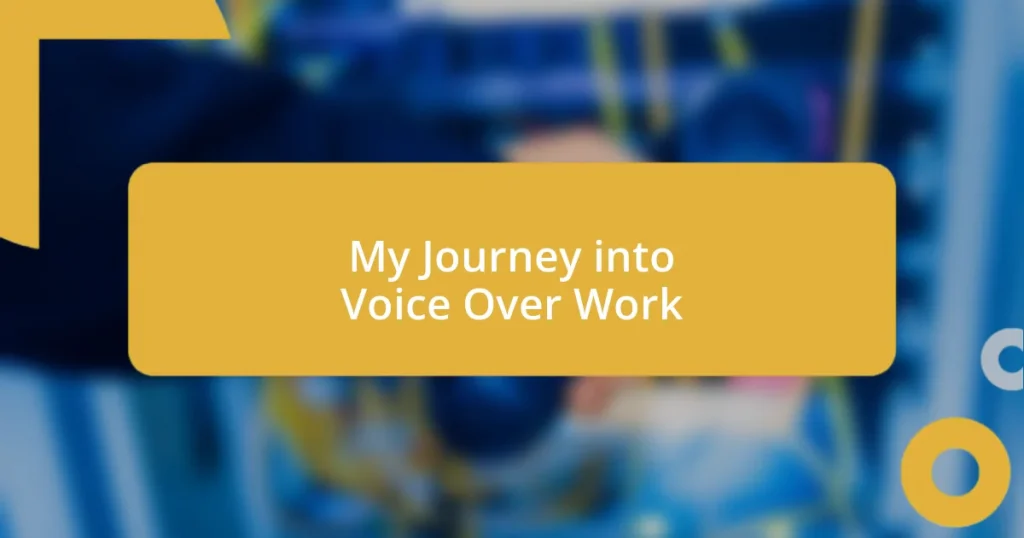Key takeaways:
- Finding your unique voice involves embracing authenticity and vulnerability, allowing genuine connections with readers.
- Identifying passions and interests through self-reflection is crucial to revealing the core of one’s creative expression.
- Exploring various styles and mediums enhances the richness of your voice, enabling deeper emotional resonance in storytelling.
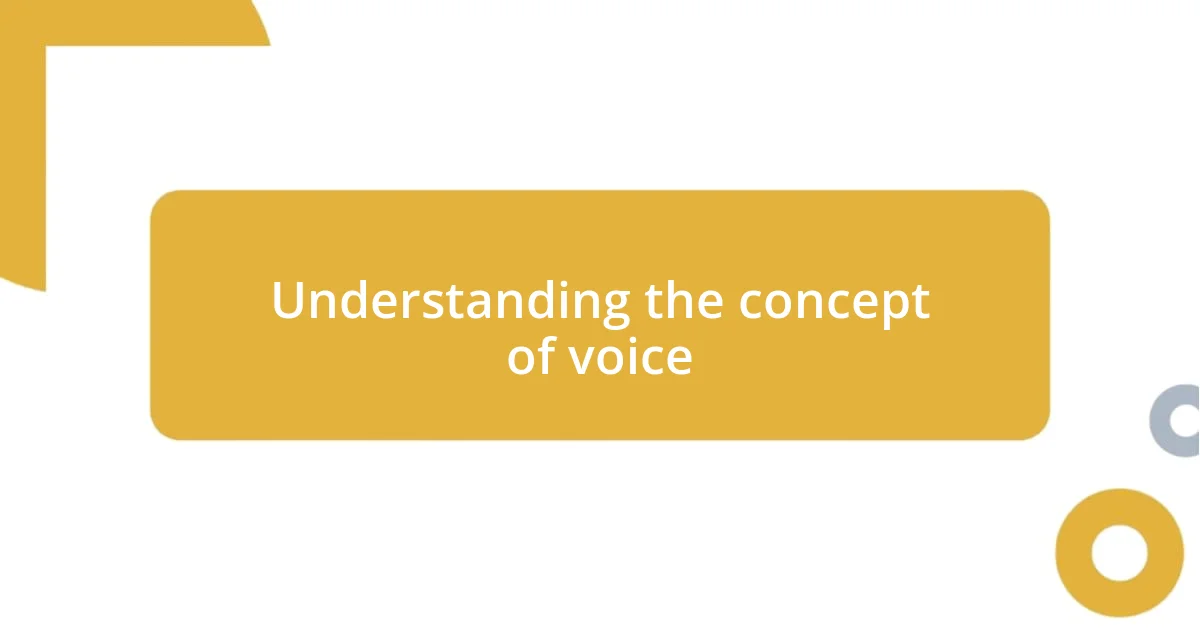
Understanding the concept of voice
Voice is more than just the words we choose; it’s the essence of who we are as communicators. When I first started writing, I remember feeling overwhelmed, trying to imitate the styles of others. Have you ever caught yourself mimicking someone else’s tone? It’s a natural phase, but recognizing it is the first step to finding your own unique voice.
Think of your voice as a personal fingerprint. It’s shaped by your experiences, beliefs, and emotions. I recall a time when I wrote an article fueled by personal passion—a story of resilience. The feedback was electric; readers connected with the authenticity that brims from vulnerability. Isn’t it incredible how our true selves can resonate with others?
As you delve into understanding your voice, ask yourself: what stories do I want to tell? I learned that embracing my quirks and imperfections made my writing more relatable. The liberation that comes from being genuine is profound. Your voice is waiting to be discovered, shaped by every word and story you share.
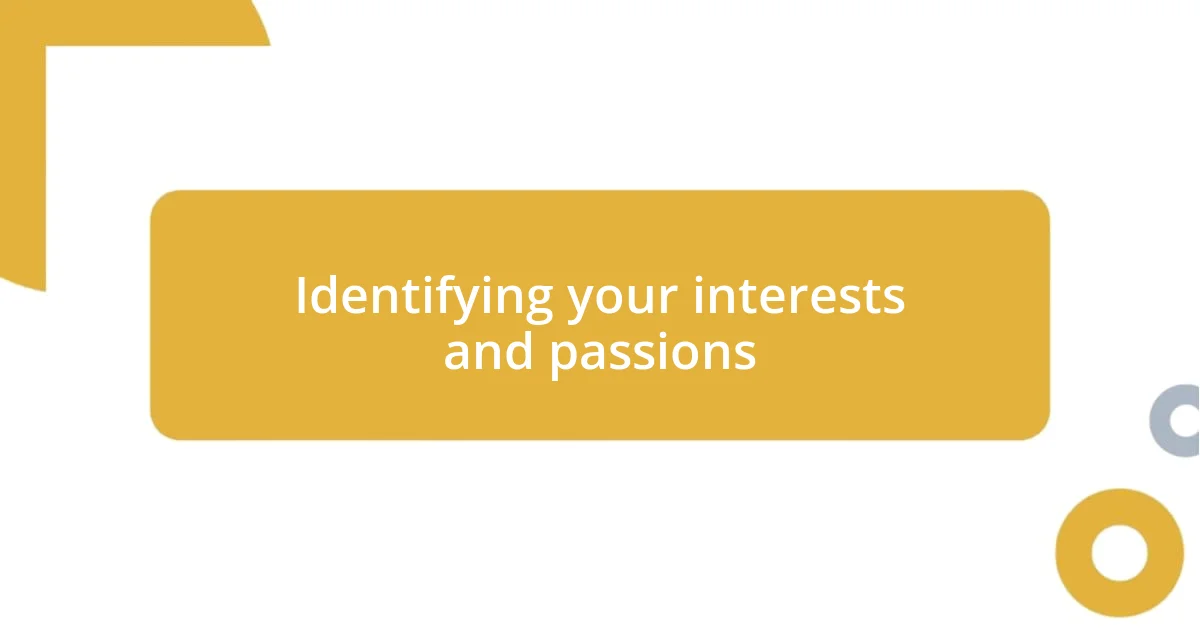
Identifying your interests and passions
Identifying your interests and passions can feel like uncovering hidden treasures within yourself. I remember the exhilaration of realizing my love for storytelling during a late-night creative writing session. The stories flowed naturally, and I felt energized. It’s crucial to reflect on what activities make you lose track of time or bring you joy.
To help pinpoint your interests, consider these reflective questions:
– What hobbies do you cherish the most?
– Which topics can you talk about for hours?
– Are there any activities that consistently ignite your enthusiasm?
– What experiences have left a lasting impact on you?
– How do you want to contribute to the world?
Engaging with these questions can often reveal the passions that truly resonate with your being. When I explored these areas, I found a deeper connection between my childhood hobbies and my writing. It gave me clarity in my creative journey, bringing me closer to my unique voice.
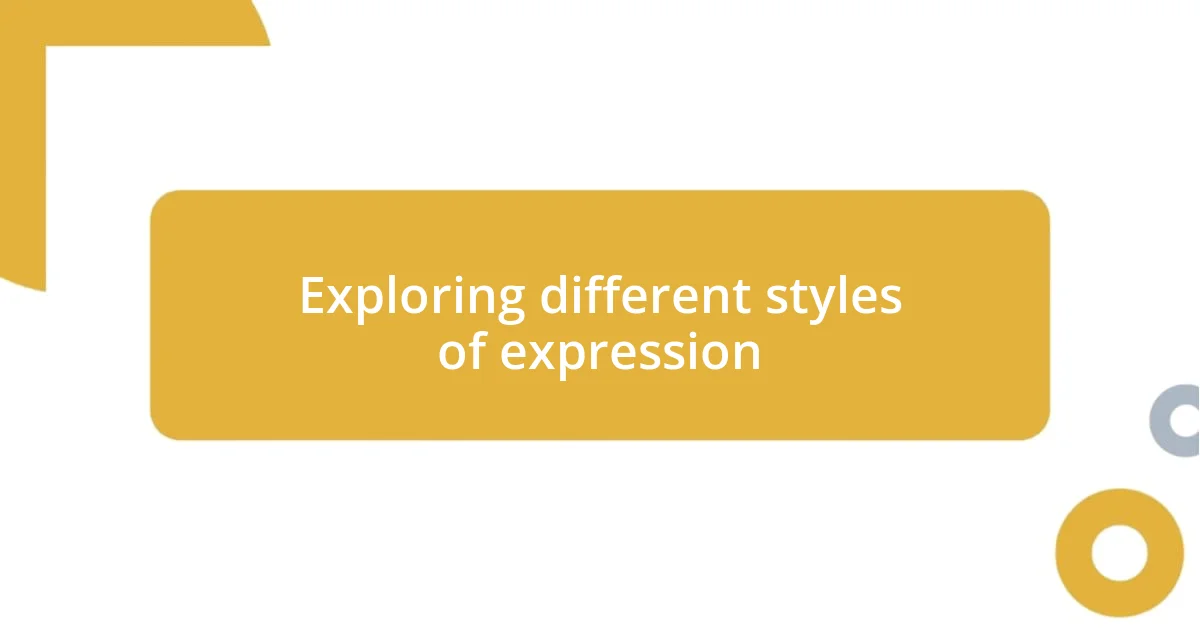
Exploring different styles of expression
Exploring different styles of expression can be a revealing journey. I vividly remember experimenting with poetry—I found that the rhythm and cadence of words resonated with me on a different level. In fact, I often felt a rush of emotion as I played with sounds, creating vivid images. Have you ever tried to express your thoughts through poetry or rhythm? It can be liberating.
Writing in various formats, such as short stories or personal essays, also opened avenues I never knew existed. I learned that each style brings out different elements of my personality. For instance, when writing a personal essay, an intimate storytelling style allowed me to delve deeper into my feelings, fostering genuine connections with my readers. It made me realize the power of vulnerability in expression.
To illustrate the impact of these diverse styles, I developed a simple comparison table that showcases their characteristics:
| Style | Characteristics |
|---|---|
| Poetry | Emotional resonance, rhythm, imagery |
| Personal Essays | Intimacy, reflection, storytelling |
| Short Stories | Plot-driven, character development, concise |
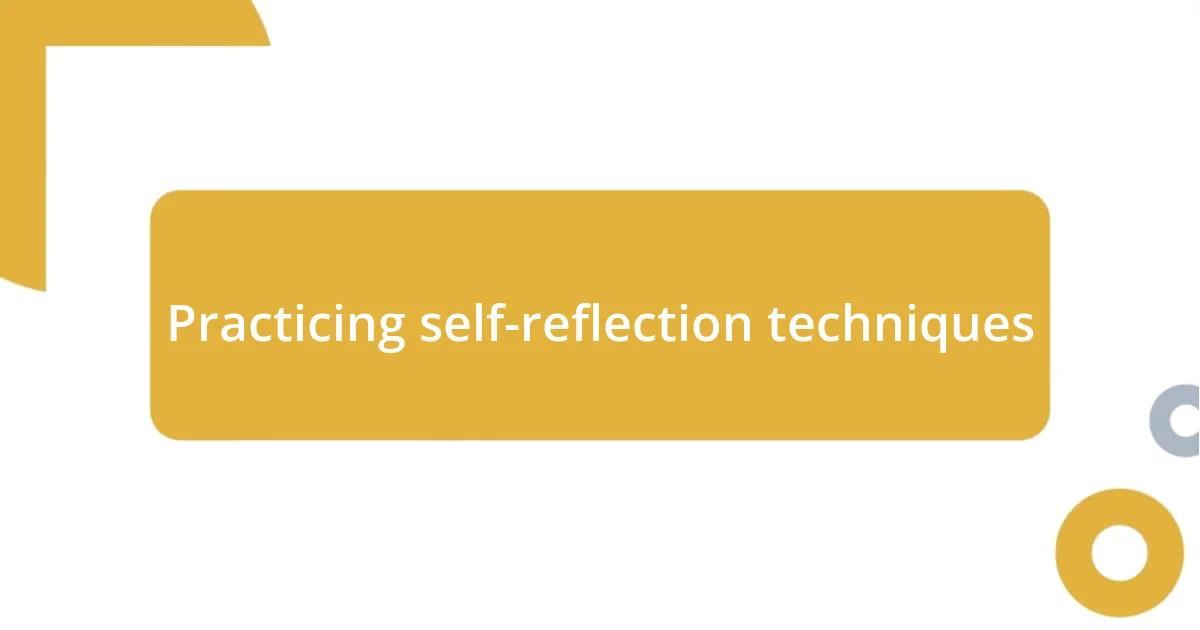
Practicing self-reflection techniques
Self-reflection techniques are invaluable as they help us dive deeper into understanding ourselves. I often find myself journaling late at night, pouring my thoughts onto paper. It’s almost like having a conversation with my inner self, where I can explore my emotions without judgment. Have you ever tried this? The act of writing can unravel thoughts you didn’t even know were buried within.
Another technique I find useful is mindfulness meditation. I remember one session where I focused on my breath and let go of distractions. That stillness allowed me to pinpoint underlying fears and hopes, shaping my understanding of my creative voice. It really felt like peeling layers off an onion. What parts of yourself have you discovered in the quiet moments?
Lastly, I’ve embraced the practice of seeking feedback from trusted friends or mentors. Their perspectives often shine a light on traits I undervalue. I recall a time when a friend pointed out how my humor enriches my writing. At that moment, I realized the importance of acknowledging and embracing different facets of my personality. Have you sought external insights to reflect on your own growth? It can be enlightening to see ourselves through others’ eyes.
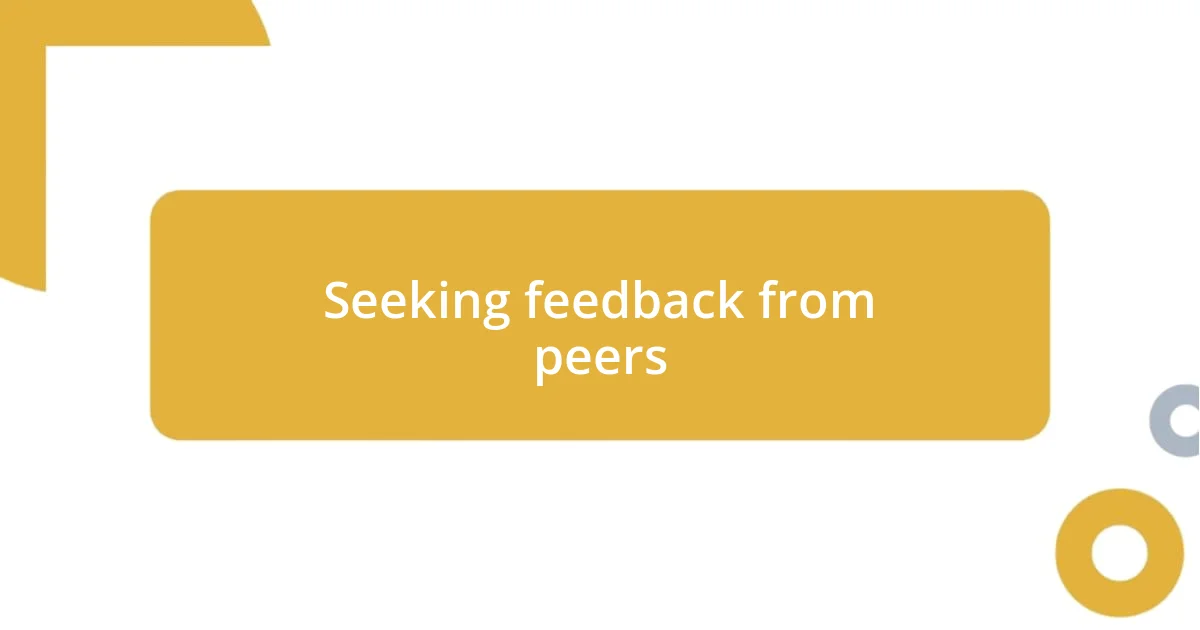
Seeking feedback from peers
Seeking feedback from peers is one of the most enriching steps in discovering my unique voice. I once shared a draft of a short story with a close writing group, and the varied reactions surprised me. One friend highlighted my tendency to create atmospheric settings, while another pointed out moments where I held back emotionally. Those insights helped me realize how important it is to welcome different perspectives—they can uncover strengths I didn’t even see in myself.
I remember the nerves I felt when I first asked my peers for feedback. It felt like standing on a stage, vulnerable and exposed. But the warmth of their encouragement and constructive criticism made me appreciate the process. Through their eyes, I learned that receiving feedback isn’t just about validating my work; it’s about engaging in a dialogue that refines my voice. How do you feel when sharing your work with others? It can be daunting, but the rewards are often worth the leap.
The best part of seeking peer feedback is the unexpected gems that emerge from the conversation. For example, a colleague once noted how my quirky sense of humor added a refreshing twist to more serious topics. This feedback nudged me to embrace that aspect of my personality in writing—a game changer! Have you ever received feedback that shifted your perspective? Those moments can be transformative, and they remind me that our writing journeys are often collaborative adventures.
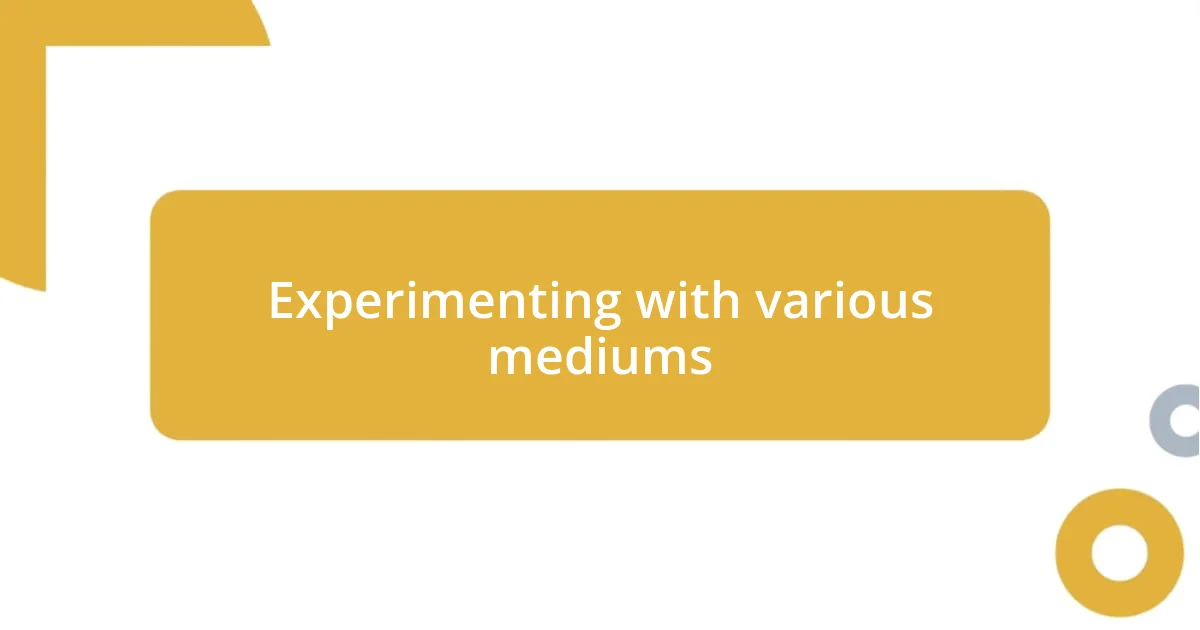
Experimenting with various mediums
Experimenting with different mediums has been an eye-opening part of my creative journey. I remember the first time I picked up a paintbrush; I didn’t quite know what I was doing, but the feeling of colors blending on canvas was exhilarating. The freedom of expression through visual art revealed layers of my voice that words alone couldn’t capture. Have you ever tried your hand at a medium outside your comfort zone? It can spark unexpected insights.
I also dabbled in audio storytelling, which completely shifted my perspective on narrative. As I recorded my own voice, weaving together sounds and emotions, it became clear that my unique inflections and pauses added depth to the story. It was interesting to witness how the tone of my voice could evoke feelings that text might miss. How do you express yourself differently depending on the medium? It’s fascinating how much our voice can evolve as we try new forms of expression.
Moreover, the experience of merging writing with digital art taught me about the power of visual storytelling. I once created a piece that paired my poetry with illustrations, and I was amazed at how the visuals enriched the experience. It’s a dual conversation with audiences, where words intertwine with imagery, creating a fuller, more vibrant narrative. Have you thought about how combining different mediums could elevate your own work? Exploring this blend can help you discover aspects of your voice that you never knew existed.
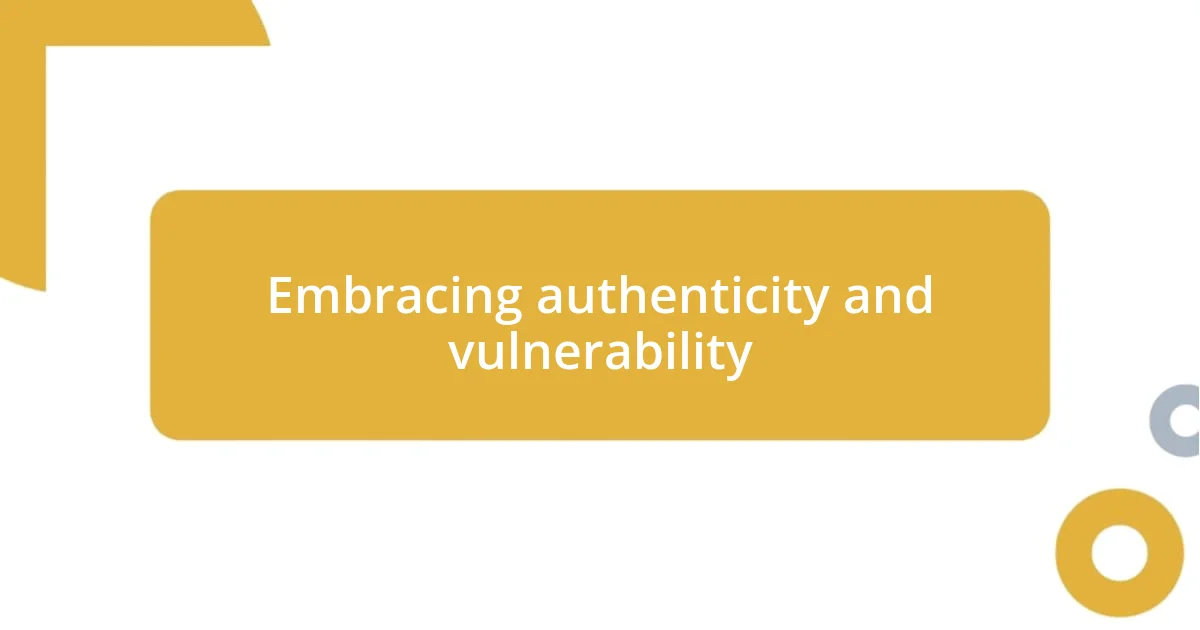
Embracing authenticity and vulnerability
Embracing authenticity and vulnerability has been a profound journey for me. I vividly recall the first time I shared a deeply personal essay about my relationship struggles. As I hit “send” to my writing group, my heart raced—I felt completely exposed. The flood of honest feedback and connection that followed was transformative. It made me realize that vulnerability is where true authenticity breathes; it opens the door for dialogue and deeper understanding. How often do we shy away from sharing our truth out of fear?
When I actively chose to write about my flaws and insecurities, I discovered an unexpected level of freedom. I remember crafting a piece about my struggles with self-doubt, and the relief I felt as the words flowed out. I had always approached my writing with a polished facade, but laying bare my vulnerabilities turned my work into something real and relatable. Isn’t it fascinating that when we drop the act, we inadvertently invite others to do the same?
There’s a certain power that comes from embracing who we truly are, flaws and all. I think back to a moment during a workshop where I read aloud a piece that showcased not just my strengths but also my insecurities. The room was silent for a moment—then I heard sniffling, and suddenly everyone was connecting over their shared experiences. It struck me that our most honest stories can resonate deeply with others. Have you ever felt that rush of connection when revealing your true self? It’s a reminder that authenticity not only strengthens our voice but also fosters a supportive community.


